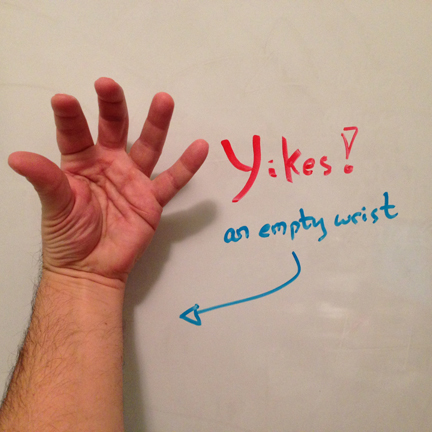 Old dogs can learn new tricks. So can people young and old. Behavior is metamorphic, although we seldom recognize that plasticity in the moment. Instead, we think the world changes while we stay the same, that our children are less responsible than we were at their age but that we threw crazier parties. We think TV today isn’t as good as the programs we watched when we were younger, forgetting how many nights we spent on “Night Court.”
Old dogs can learn new tricks. So can people young and old. Behavior is metamorphic, although we seldom recognize that plasticity in the moment. Instead, we think the world changes while we stay the same, that our children are less responsible than we were at their age but that we threw crazier parties. We think TV today isn’t as good as the programs we watched when we were younger, forgetting how many nights we spent on “Night Court.”
Sometimes, though, the planets align and we see our own behavior as it changes in the moment.
Here is one such story.
The Jawbone UP has decorated my wrist and recorded my physical activity since mid-March of 2013, but I did not reckon with how I depended on its steady flow of information and quiet alerts until it stopped working. Ironically, this happened last week when I was guiding tours for Story-Tech at the Consumer Electronics Show (CES) in Las Vegas, where wearable computers were a key technology with massive year-over-year growth, and I could no longer demonstrate how it worked to my tourists.
But the real impact of my UP’s absence didn’t hit until both my wife Kathi and I returned home from overlapping business trips, mine to CES and hers to the Modern Language Association.
Kathi is a night owl working late and I’m an early bird (it’s a mixed marriage), so the unheralded killer feature of the Jawbone UP and its kindred gadgets (Nike FuelBand, Fitbit Force) is the silent alarm that vibrates on my wrist when I get up before dawn to work while the world is silent and all the thoughts are mine to think.
Before the UP, a clock radio or smart phone would chime, blare or buzz, disturbing Kathi and sometimes failing to wake me (the first five or six times). It took time getting used to sleeping with a bracelet, but I came to depend on that quiet buzz to get me up and let me lurch from the bedroom and pad towards the coffee machine like a sneaky zombie.
The UP’s death didn’t much affect me in Vegas because the Aria let me program the windows to open and the TV to pop on at a designated time. Before Kathi got back from the MLA I simply used my old nightstand clock radio to wake myself. But since her return I find myself waking up every couple of hours because I am so anxious about my iPhone’s coming bleep.
So I haven’t slept well, feel my stress level rising, and await the arrival of a replacement UP with less than graceful patience. This is now the third time I’ve had to write to Jawbone for a replacement in less than one year, and so I find myself wondering if I should give the Fitbit Force a try just because I don’t want to go through this again.
This put me in mind of a fascinating article in December’s Scientific American: “How Google is Changing Your Brain” (preview link here but subscription required and recommended). The internet’s infinite laundry pen memory has eroded our need to rely on other people to remember things and erodes the difference between information we store in our heads and the information we know is waiting in the cloud.
We’ve always perceived of our possessions as parts of ourselves. The comic book visionary Scott McCloud observed in his brilliant book “Understanding Comics” that when another car bumps your car from behind we don’t cry out “his car hit my car!” but “hey! he hit me!” The difference is that with computers and particularly with wearables the devices on our bodies talk back to us in new ways.
As I’ve written elsewhere, I have outsourced most of my remembering tasks to Evernote and Instapaper, but my morning wakeup routine isn’t information— it’s action. And so it’s only a minor exaggeration to say that the UP band has become a part of myself, so much so that when it’s gone I have to adjust in surprising ways.
“Never trust anybody over 30,” a cliché of the mid-1960s free speech movement, mistook an perceived mental inflexibility in the generation of the protesters’ parents with an age-related unwillingness to think and behave in new ways. This is a common mistake and we make it in both directions, substituting life stage behaviors for generational ones and vice versa.
So, the pundits who claim that Millennials will never care about their privacy and will always overshare on Facebook are wrong: the Millennials just didn’t need to think about why not to overshare until they were on the job market and had to cleanse their profiles of the sexy selfies with the bong in the background. Behaviors can change.
As a youth I would not have expected my behaviors to change so quickly when I had hit middle age, but they did with the UP band.
According to the UPS tracker my replacement UP should arrive today. If it doesn’t, I think I’m buying the Fitbit Force.
Leave a Reply